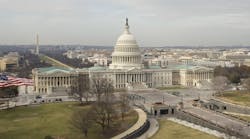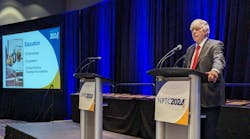Awaiting the outcome of the November elections— less than two weeks away at this writing— at least one thing’s certain: Nothing will be done to prevent never-give-an-inch partisan politicians from driving the U.S. economy over the so-called “fiscal cliff” until after the voters have spoken.
“Fiscal cliff” is dramatic shorthand for the intensely negative impact that a package of federal tax hikes and spending cuts set to automatically take place this Dec. 31st will have on the economy--- if no action is taken to modify the enabling legislation.
If the cliff is left in place, according to the non-partisan Tax Policy Center (TPC), taxes could be boosted by more than $500 billion in 2013 when many temporary tax provisions are set to expire.
“Nearly 90% percent of Americans would pay more tax, primarily because the temporary cut in Social Security taxes and many of the 2001/2003 tax cuts would expire,” stated TPC. “Low-income households would pay more due to expiration of tax credits in the 2009 stimulus. High-income households would be hit hard by higher tax rates on ordinary income, capital gains, and dividends and by the new health reform taxes. And marginal tax rates would rise, potentially affecting economic decisions.”
Bob Costello, chief economist & vp of the American Trucking Associations (ATA) has called the fiscal cliff a severe “policy-driven” risk to the economy. By that he means it is up to Congress and the White House to prevent the country from calling over it. But, as he cautioned in a recent speech, lawmakers may do nothing about it until sometime next year!.
That dire prediction comes despite the very existence of the cliff having already caused harm. “Inaction [thus far] on the fiscal cliff is already putting a significant drag on the economy,” stated Costello. “Concern over the cliff is leading businesses to reduce hiring and [capital] investments.”
He also noted that even businesses flush with cash are avoiding any of the expected “risk-taking” that normally helps boost the economy: “Business investment is already plunging and that is coupled with sluggish hiring,”
Costello said he expects the lame-duck Congress that will be in session after the elections “will kick the can down the road,” making it the job of the new Congress to address the fiscal cliff. And he predicted that “most likely” won’t happen until next summer. “That ‘punt’ [of dealing with it] will delay the immediate consequences, but hurt the economy by continuing uncertainty [over its eventual impact].”
That fixing the cliff is an issue of grave importance was underscored by the letter sent recently to President Obama and Congress by leaders of 16 of the largest financial services firms. It warns that if the automatic tax hikes and spending cuts are not altered, interest rates could spike significantly.
The letter, sent by the Financial Services Forum trade group, comes as the White House and congressional Republicans appear, as The Washington Post recently put it, “prepared to play a game of chicken” over who moves first on the cliff.
The newspaper also has pointed out that if Obama wins reelection, he “may finally be able to dictate the terms of a bipartisan debt-reduction deal.” And if he loses to Mitt Romney, Obama could instead “make sure that tax rates rise before he hands over the keys to the White House.”
Either way, there’s no time like now to urge your representatives in Congress to take action to block off the cliff just as soon as they get back to work, be they lame ducks or not.



